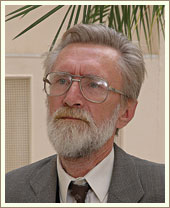One of Russia’s leading anti-Nazi campaigners was assassinated in his home, apparently in a revenge attack after he helped to convict Russian extremists. Nikolai Girenko, 64, was shot in St Petersburg on 19 June 2004. The killer fired at least one round from a sawn-off shotgun through the wooden door of his communal flat, striking the academic in the chest.
The anti-fascism expert, trained as an anthropologist, worked for the Public Campaign Against Xenophobia, Racism, Ethnic Discrimination and Anti-Semitism, and collaborated closely with various human rights groups. Colleagues say that he had received several death threats, and the communal entrance hall to his flat had been daubed with fascist and racist graffiti.
Mr Girenko was best known for his work in the trial of three youths accused of the racist murder of an Azerbaijani man in 2002, and for the role he played in the trial of an extremist group called Schultz-88 (eight standing for the eighth letter in the alphabet, H, 88 therefore signifying Heil Hitler).
He had angered many, testifying in the past two years alone in more than 20 cases against racist publications and gangs. One of those he testified against, Dmitry Bobrov of the Schultz-88 group, described Girenko as a “Russophobe” and an agent of the “Zionist New World Order”.
As Pamyat and other Russian nationalist groupings emerged in 1986 with the liberalisation unleashed by Mikhail Gorbachev, Girenko became concerned and began his investigations into the fringe movements.
In the early 1990s he was elected to St Petersburg city council, where he was a member of the committee on human rights and ethnic minorities. He worked tirelessly to help the city’s minority communities organise cultural centres and protect their rights in am increasingly hostile environment. He helped write a manual for the police on racist crimes.
